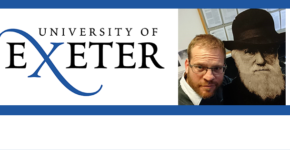Category: Mathematics
-

Peter Fox, Rensselaer Polytechnic Institute – Data Set Analysis
On Rensselaer Polytechnic Institute Week: Are the secrets to solving our problems hiding in plain sight? Peter Fox, professor and tetherless world constellation chair, details how it’s all in the data. Peter Fox is a Tetherless World Constellation Chair and Professor of Earth and Environmental Science, Computer Science and Cognitive Science at Rensselaer Polytechnic Institute.…
-

Tamas Budavari, Johns Hopkins University – Using Astronomy Tools to Fight Urban Decay
To fix urban decay, look to the stars. Tamas Budavari, assistant professor in the department of applied mathematics and statistics at Johns Hopkins University, describes how a tool to map the stars could help fight urban blight. Tamás Budavári’s primary interest is in cosmology, large-scale structure, and galaxy evolution. He has been focusing on various…
-

Caleb Everett, University of Miami – Anumeric Societies
Could we live our lives without numbers? Caleb Everett, anthropological linguistics professor at the University of Miami, discusses how some primitive societies still do and how we use numbers to make our lives easier. I’m a cognitive scientist, more specifically an anthropological linguist. My research examines the ways language affects and reflects human thought. Much…
-

David Zuckerman, University of Texas at Austin – Randomness
How do you have a breakthrough in randomness? David Zuckerman, professor in the department of computer science at the University of Texas at Austin, details randomness and how algorithms and computers can make sense of it. David Zuckerman holds an Endowed Professorship in the Computer Science Department at the University of Texas at Austin. He…
-

Chris Westbury, University of Alberta – Mathematical Theory of Humor
What makes you laugh? Chris Westbury, professor in the department of psychology at the University of Alberta, explores humor and why we find weird things funny. I am a professor at the University of Alberta in Edmonton, Alberta. I am a clinically-trained research psychologist whose work focuses on understanding the cognitive structure and neurological underpinnings of…
-

Martin Krieger, University of Southern California – Primes and Particles
What used to be simple, may now be more complex. Martin Krieger, professor of planning at the University of Southern California, explains that as we look deeper into what we thought we knew, new details emerge. Martin Krieger’s current work is on defense and military policy, and on uncertainty and ambiguity. He has done social-science…
-

Sasha Dall, University of Exeter – Genes as Cues for Development
What do your genes say about you? Sasha Dall, Senior Lecturer in Mathematical Ecology at the University of Exeter, examines how genotype and local environment work together during development. The primary aim of my research is to explore how animals cope with the unexpected opportunities and dangers they face in their day-to-day lives. To this…
-

Tom Stace, University of Queensland – New Standards of Measurements
Do we need to update our standards of measurements? Thomas Stace, associate professor in the school of mathematics and physics at the University of Queensland, informs us of the way he and his colleagues are re-thinking these long held standards. Dr Stace completed his PhD at the Cavendish Lab, University of Cambridge in the UK…
-

John Mayberry, University of the Pacific – Math & Sports
Math and sports are starting a new relationship. John Mayberry, assistant professor in the department of mathematics at the University of the Pacific, explains how math is doing wonders for his school’s water polo team. The work by John Mayberry, an associate professor of mathematics at University of the Pacific, and Pacific’s water polo coach,…

